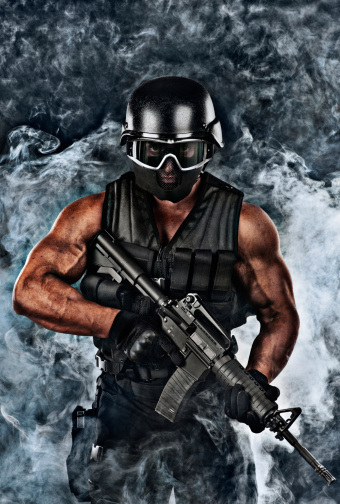Jennifer Bray-Weber's Blog, page 95
October 3, 2012
Pinterest for the Author
Song of the Day: Unity by Shinedown
I’m a visual person. I learn, imagine, and write visually. So it might come as no surprise that I love to whittle away time on Pinterest. Of course that might just be an oxymoron, as I don’t have much time to whittle.
The images and photography I have seen on Pinterest are amazing, breath-taking, heart-wrenching, useful, arousing, and inspiring.
But Pinterest is another social media site. And like all social media sites, there are opportunities for authors to market themselves.
Here are a few tips for making Pinterest work for you.
Indentify yourself! Fill out the About Me section. Don’t forget to add links!
Mine reads:
Author of dark, steamy, and adventuresome historical romance.
Visitors to my page will discover who I am and where to find out more.
*Optimize driving traffic to your page by using keywords and board categorization.
Ex: Board Title: Pirates Categorization: Film, Music, Books
This narrows down searches, making it easier to find images.
*Title and describe boards to segment target market and/or audience.
Ex: Romantic Suspense, Fashion, Holiday Ideas, Recipes, Books on Writing Craft, Movies That Inspire Me, etc.
These different boards likely have different audiences. Take it further and describe the boards. Ex: Board Title: Gothic, Steampunk, and Fantasy Description: Images encouraging the fanciful illusions of my paranormal muse.
*Pin imagery that reflects you, your personality, and your brand.
*Use boards to your advantage – generate storyboards for WIPs, create boards dedicated to each of your books, add music videos that inspired books or characters, develop boards of your favorite authors; the possibilities are endless.
*Link book covers to your website or directly to buy sites like Amazon.
*Engage – repin, like, comment, respond, and follow
*Cross promote using social media integration. Pinterest has made it easy to like, tweet, and share pins. Plus, it is a great way to build an audience.
*Pin what’s trending. The reasoning? More exposure, of course.
*Quality over quantity – don’t pin for the sake of pinning. Oh, it’s easy to do. Pinning can be quite addictive. But as authors, this goes back to what defines you and your brand.
*Credit the sources.
It’s all about exposure and engagement! Stop by my page. http://pinterest.com/jbrayweber/
Do you Pinterest? Got any Pinterest tips you’d like to share? How about Pinterest questions? Let me hear from you!


October 2, 2012
Link of the Week – Booksai
This week’s link is practical and fun. And who doesn’t like a little fun?

Image provided by Getty
Booksai is a site with a tool to discover books and authors with similar tones, styles, and moods. Just plug in a passage from your favorite book, and presto! A list of comparable books are given, and in several genres, too!
Readers can use Booksai to find recommendations based on a book they enjoyed that is driven by author style rather than the traditional sales ranking and purchasing history. Pretty nifty, eh?
Authors can use Booksai to see which other authors might resemble their writing style. The results are given by percentages in similarity and complexity. How cool is that?


September 27, 2012
3 Genius Ways To Tell If Your Writing Is Any Good- Guest Diane Holmes
Writing is easy: All you do is sit staring at a blank sheet of paper until drops of blood form on your forehead. ~Gene Fowler
Diane Holmes is my resident genius and she graciously allowed me to re-print an article she wrote over at the Free-Lance Zone a while back. When I say she’s a genius…I’m not kidding. Go make a cup of tea, put your feet up and have a good read! Take it away, Diane-
You can’t prove your writing is any good.
Not like you can in math or computer programming. Not with a result you can point to and say,
That page right there is ‘always true.’
It works ‘as expected” and is ‘fit for use.’
My project requirements are satisfied. The glory is now mine!
You can learn and develop powerful skills. Mad Ninja writing skills.
You just can’t look at the end product and objectively test for “goodness.”
Michelle Davidson Argyle wrote a 2-part article over at Literary Lab on this subject, asking readers to choose between 3 paragraphs in search of goodness and post their thoughts in the comments..
The comments are full of insight on the logic behind the readers’ choices. A must read on the topic of subjectivity. And Part 2 is a must read on the topic of reality vs. preference.
And yet…
You can’t say that all writing is good, because it’s all subjective. Surely there is some difference between those who have developed mastery and those who… have room for improvement.
And surely you can evaluate your own work, right? Just you, alone in a room, evaluating your own work.
But as Nathan Bransford, former literary agent, points out, clear evaluation is not what happens. He wonders…
What is it about writing that makes people put on the blinders and fail to recognize their limitations and makes the talented unable to recognize their own goodness?
(The comments on Nathan’s post are worth the read!)
The “Someone Else” Solution.
Get someone else to read your writing. That’s often the advice given. A reader, a critique partner, a teacher, an editor. If they like it, then it’s good!
Ah, okay, first there’s a quality issue. (Do they know quality when they see it or just what they like?)
Then there’s a “good match” issue. (Are they a good match for your topic, style, or genre?)
And finally there’s a “will it sell” issue that becomes some sort of defining determination of goodness. Everyone (especially editors, but even readers) has some sort of criteria called, “You can’t do that because it won’t sell.” Or alternatively, “It’s not done like that.” Or even, “Yeah, that seems like all the other books I read.”
Behind almost every single first book is a trail of rejections where readers, critique partners, teachers, editors, agents, and contest judges who thought it was or wasn’t good.
And then it sold.
The Touchstone Solution
Okay, here’s what I think.
I think everything about writing and reading is, indeed, intangible.
That you can recognize mastery, even if the mastery doesn’t equate to an excellent reading experience for you.
And I think you can find touchstones to answer the Goodness question.
Here’s what I mean when I say touchstone. I mean someone or some specific works that hold the standard (Ideal Beauty) of where you want to be.
1) Specific Craft Touchstones
I think your touchstones should be narrowly defined if it’s to be of any value to you.
For example: I admire the dialogue of Elmore Leonard, specifically the way it captures very conflicting personality traits, takes sharp left-turns on subject so that you feel punched by the truth, and is often full of threat yet totally cool and hip.
As I progress in dialogue mastery, I can use the specific aspects of Elmore Leonard’s dialogue as a touchstone to help me assess my own writing.
Not to mimic Elmore Leonard, but to achieve that level of mastery (and delight) of “left-turns” in my own dialogue.
2) Reader Touchstones
Writing is about delighting a reader. So, yes, other people are involved in deciding what they enjoy reading, what they consider good.
So find the reader (critique partner, teacher, whoever) whose idea of goodness represents what you want your book to be judged against. Delight that one reader.
You might think this is nuts, but quit trying to please everyone, including those people who disagree with each other. Instead try to master storytelling for your one right reader.
How this is different from the “Someone Else” solution.
What I’m saying here is that all opinion is not equal. You should chose the opinion because you agree on quality (not that you agree on their career path in the publishing industry somehow equals goodness).
And that the opinion should become a touchstone for you as you write. “How much will this particular chapter delight this touchstone reader?”
This is about letting someone make a pronouncement about what you have written. It’s about writing to delight a reader who cherishes the goodness you’re reaching for. And then allowing you to evaluate if you’re reached that goal.
3) Vision Touchstones
One of the best things a critique partner (another writer) can do for you is to hold the vision of your story with you, to be able to see how great this story can truly be.
This is also the person who can discuss with you if you’re reached your own story vision.
And as you write, you’ll have some “other” out on the mental landscape who you know will be waiting for you to create “this page right now” in a way that fully captures that vision.
So you can get real feedback from the writer, but you’ll also have a sense, alone in a room, if you’re fulfilling your vision simply because you’re aiming at the story hopes of another writer.
And that is very cool stuff.
—
Diane writes two alternating columns for Freelance-Zone:Fiction-Zone: Leaps in FictionMastery and Marketing-Zone:Marketing-Zone: Marketing Yourself and Your Book.

September 26, 2012
Hump Day Kick Start – Sweat Edition
Song of the Day: Unraveling by Sevendust
Hump Day Kick Start – for your muse, a writing picture prompt, or just a visual treat.
I’m so excited about football this season. Love the game and I love my team. Go Texans! I swear I get ulcers from watching the games. At any rate, this week’s HDKS was found perusing pix of men in tights wielding pigskins.
Tell me about our hottie. He’s been working up a healthy sweat (hey…sweat can be good!) at the gym. But who is he? Is he a football player? MMA fighter? Health nut junkie? Romance cover model?
Why is he anguished? Maybe his girlfriend broke up with him, or he lost the championship game, or maybe his partner was shot in the line of duty and he’s working out his frustration. Or did sweat just get into his eyes? Oh, the possibilities.
I’d love to hear your take.


September 20, 2012
Buy Cough Syrup And Your Favorite P.O.D. Book At The Same Time
And by the way, everything in life is writable about if you have the outgoing guts to do it, and the imagination to improvise. The worst enemy to creativity is self-doubt. ~Sylvia Plath
Good Morning Muse Trackers!
I have just run across an amazing bit of news. I sincerely hope it isn’t the case of the whole world already knows this and I’m getting clued in at the last minute, but here goes. In the not so very distant future, you may be able to print your e-books at CVS and other convenient locations. I think this has the potential to change the whole game. At the very least, it will bring in a whole segment of the population that simply won’t convert to e- formats. (I’m very excited by this, can you tell?)
A company, On Demand Books, has created a machine that will be able to print self published books and also the more than seven million backlist and public domain titles in its catalog. The Espresso Book Machine (I love what they call it.) will be able to print a book out in minutes and it can contain pictures as well. I see all sorts of possibilities for the future. Will it be much longer before we can include short films? My books take place in exotic locales, what about a photo journey?
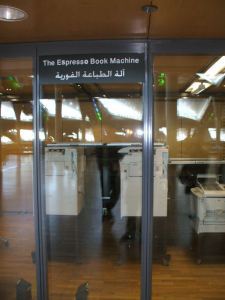
Here’s an example of an Espresso machine in Alexandria, Egypt!
On Demand has partnered with Kodak to add print-on-demand technology to Kodak Picture Kiosks which are not only located throughout the United States, but are found all over the world! They have also formed a partnership with ReaderLink, which distributes books to grocery stores, drugstores, mass market and club stores as well, to make even more titles available through Kodak Picture Kiosks. As it stands, there are 105,000 kiosks globally. Book releases will begin this year in the U.S. and will expand on the international front in 2013. While the Espresso Book Machines are already in about 70 bookstores and libraries globally, Kodak will be able to expand their footprint immensely.

Think of the possibilities!
“We envision an integrated solution that can substantially redefine the publishing industry and bring exciting new solutions to customers,” said On Demand CEO Dane Neller in the release.
I also found on the Espresso Machine’s web site that they are excited to help authors connect their works with others. The books will have full color covers and black and white interiors making it indistinguishable from books produced by traditional publishers. If an author chooses to use this system, they retain all rights and the author also has the responsibility of setting their own price point. They have many different programs to assist writers such as EspressNet and The Shelves program which are detailed on their site http://ondemandbooks.com/self_publishing.php EBM will also go beyond simple printing as they offer full publishing packages including editorial, design, layout etc.- whatever you might need.

September 19, 2012
Yo, Ho, Ho and a Bottle of Rum!
Song of the Day: Slither by Velvet Revolver
“Ah. Rum and a new flintlock. Brings a tear to me eye.” ~ Henri, The Siren’s Song
Drink up, me hearties! Today is International Talk Like A Pirate Day! For me, it’s like a holiday. No surprise, there. And because it’s a holiday, I’m going to post a blog I wrote that  originally appeared on Carina Press’s blog. Hey…it’s a holiday. We pirate wenches don’t work on holidays.
originally appeared on Carina Press’s blog. Hey…it’s a holiday. We pirate wenches don’t work on holidays.
So for fun, let’s talk about something near and dear to a pirate’s heart. RUM!
Pirates sure loved their liquor. Who could forget the Pirates of the Caribbean scene where Elizabeth Swann burns Jack’s stash on a deserted spit of land to signal a passing ship for help. Poor Jack was beside himself. Oh yes, pirates loved their sauce. Perhaps it was pirate Richard Haines who said it best with this sentiment. “A life without liberty is not worth living. But a life with liberty and no beer mug ain’t much better.” Hear! Hear!
As colorful as pirates were, both in fact and fiction, so were their choices of poison. They guzzled rum, beer, brandy, and wines.
But man needs water to survive. Fresh water, also known as sweet water, was a precious commodity because stagnant water often soured in their casks. Think – slime in the ice machine. Yuck! So to make the water more palatable, rum, beer, or wine was added. The mixture was called grog and was rationed out to crewmen daily.
Pirates were quite creative in their elixir concoctions, too.
Bumboo was an alcoholic beverage of rum, sugar, lemon and lime juices, and nutmeg. Drink this, mate, and you may stave off a bout of scurvy.
Arrack was made from fermented fruits, grain, and sugar cane. Toke was liquor made from fermented honey. I’m not entirely convinced that these drinks were sweet to taste.
Kill-Devil rum included booze, beer, and raw eggs. Eww!
Hangman’s Blood, a potent medley of various strong liquors, could knock even the most hardened fellow on his arse. It was probably best not to smoke while drinking this mixture for fear of igniting. Whoosh!
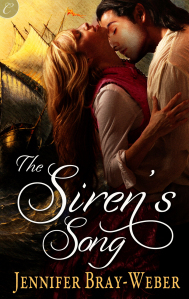 In The Siren’s Song, pirate Captain Thayer Drake’s rum drinking is one battle he can’t seem to win. Perhaps Gilly, the beautiful songstress he saved from drowning, will help him kick the habit. But not after one particularly exasperating evening with her. Instead, he hits the bottle harder than usual, stirring gunpowder into his rum. Gunpowder rum? Yes, pirates did do this. Gunpowder contains saltpeter which was believed to deaden sexual desires. It was also thought to inspire courage and aggression before heading off into battle.
In The Siren’s Song, pirate Captain Thayer Drake’s rum drinking is one battle he can’t seem to win. Perhaps Gilly, the beautiful songstress he saved from drowning, will help him kick the habit. But not after one particularly exasperating evening with her. Instead, he hits the bottle harder than usual, stirring gunpowder into his rum. Gunpowder rum? Yes, pirates did do this. Gunpowder contains saltpeter which was believed to deaden sexual desires. It was also thought to inspire courage and aggression before heading off into battle.
To read an excerpt of The Siren’s Song, click here.
As far as swilling goes, I think I’d fit in just fine with the pirate brethren. From rum and cola to the fruitier Jamaican Sunrise, I love rum drinks. What’s your favorite rum drink? Not a fan of rum? What is your adult beverage of choice?


September 18, 2012
Link of the Week – askDavid
I just stumbled upon this site and thought how cool is that? This is a great spot for both readers and authors!
askDavid.com is a site ‘publishes reviews submitted by the community’. The reviews added here are NOT found anywhere else on the web. Each product has it’s own page. 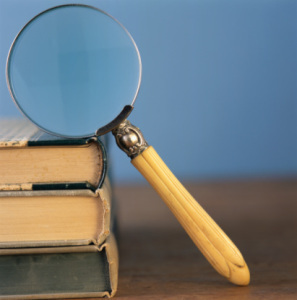 Along with any askDavid.com reviews, there are reviews found on Amazon, a section to add a review of the book, and recommendations. Oh, and Daivd, himself gives a description or nugget of information, about the book, too.
Along with any askDavid.com reviews, there are reviews found on Amazon, a section to add a review of the book, and recommendations. Oh, and Daivd, himself gives a description or nugget of information, about the book, too.
So who is this David fellow? He’s the handsome and clever virtual character (or spokesman) for the site.
Here’s a page for one of my books, BENEATH THE WATER’S EDGE, for an example.
http://askdavid.com/item/b0070y2v4w
And it’s not just for books, either. Movies, music, electronics, furniture, cute shoes, truck tires, vibrators … hey, just about anything.
Know what else? Authors can advertise their books on this site for FREE! Yes…FREE! What are you waiting for? Go check it out!


September 13, 2012
Can You Hear The Bell Of Clarity?
It took me fifteen years to discover I had no talent for writing, but I couldn’t give it up because by that time I was too famous.- Robert Benchley
A year ago I wrote an article for Muse Tracks called The First Five Minutes With James Scott Bell from my notes at the Story Masters’ Conference.
I was amazed at the amount of information and how I could directly apply his advice to my own writing. This year I will attend The Lone Star Conference where he will be the teacher once again. Since the date, October 13, is fast approaching, I’ve gone back over my notes to see where I’ve used some of his advice in my own writing.
Do you remember when Dorothy states that there’s no place like home? This is one of the main themes from The Wizard of Oz. Now, who remembers how she started the movie? If you will recall, she bursts into song about how great life is somewhere over the rainbow and she’s sure there’s a place behind the moon that’s beyond wonderful.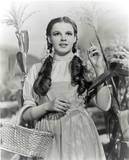
Who remembers that great classic film, Casablanca? Rick, played by Humphrey Bogart, is a bar owner who claims that he sticks his neck out for nobody! He only makes a move if it benefits him in some way. By the time the story is told, not only does he stick his neck out, he sticks it WAY out risking imprisonment and losing everything.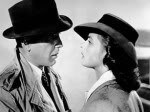
Theme. That’s a big scary topic when you’re trying to develop your story line. Sometimes it feels like the 800 pound gorilla sitting on top of your computer screen. How do you know what it is? Should you have it all tied up before you start? Mr. Bell says that answer lies within you and your style of writing, but at some point you should be able to answer this question for your hero or heroine. Twenty years after your novel is over, your lead character has had all that time to look back over their shoulder, someone asks, “Why did you have to go through that? What did you learn?”
I was blown away. That’s it? That’s how you finally figure out what the main theme is to your book? After the initial shock, I was relieved. I actually had a concrete way to figure out what my book was truly about! Rick and Dorothy were interviewed and we discovered that there’s no place like home and sometimes you have to live beyond your own needs. Once the author learned that, they made it a point to begin the story with the leads absolutely on the opposite side of the coin. They HAD to go through the journey to discover a truth.
This may be remedial writing for some of you, but for me, I discovered a new depth to my main character. I also found two key components to my story that were there, but now I knew how important they were to her development. My heroine thought she had lost all of her family to a natural disaster and was then adopted out. Piper discovers, as an adult, she has a blood brother. Not only that, she discovers that he’s known about her all along and has kept tabs on her. However, he doesn’t contact Piper until he desperately needs something from her. She also discovers that her adopted father, whom she adored, played a key role in keeping her and her brother apart. Feeling betrayed by both of her families, the journey leads her to the realisation that family is more than simply blood connections and true courage is more than fighting, sometimes it is a complete surrender.
All of this was discovered is less than one page of my notes with James Scott Bell. Can you imagine what I learned after listening for a whole day? My pen is ready, my conference ticket bought and I can’t wait to see what I discover about my characters this year with the story master.
For more information on The Lone Star Conference: http://nwhrwa.com/


September 12, 2012
Hump Day Kick Start – Take Down Edition
Song of the Day: Diamond Eyes by Shinedown
In honor of the military, I give you today’s Hump Day Kick Start. You’re welcome.
So what do we have here? Who is our well-armed mystery man? Does he serve the military? Is he a mercenary bad-ass? Maybe he’s in a covert operation. If so, what is it? Terrorists? Rescue mission? Apocalyptic vampire cleansing?
What’s with the smoke? Is it a smoke bomb? Burning building? Cryogenic vapors?
I’m getting an Expendables vibe from him and, not-surprisingly, I’ve already surrendered. What about you? What’s your take on today’s pic?


September 11, 2012
Link Of The Week
Let’s say you’ve finished your book, edited the dickens out of it, put it up for sale, and now want to list it for free.
How do you make the most of your free book? How do you get the word out there that it’s even available? Well, wonder no more! A friend of mine sent this link to me and I HAD to share it with you. I think you will find it to be a wealth of information!
http://pimpyourbooks.blogspot.com/2012/05/benefits-of-kdp-select-free-days.html




